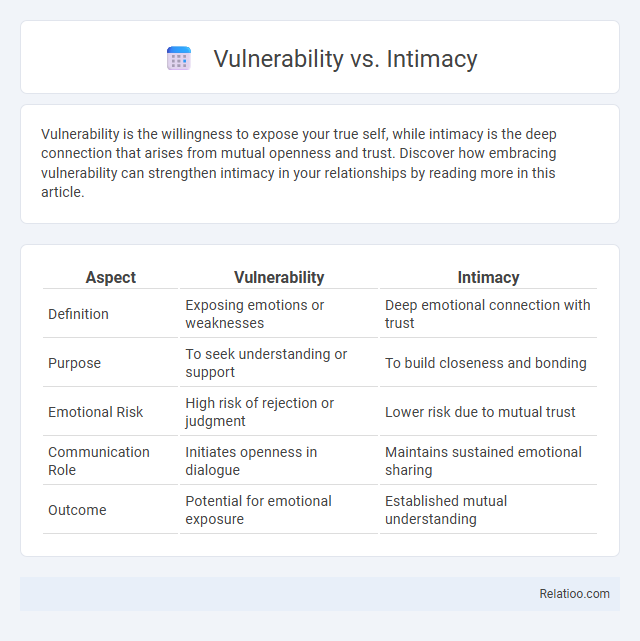Vulnerability is the willingness to expose your true self, while intimacy is the deep connection that arises from mutual openness and trust. Discover how embracing vulnerability can strengthen intimacy in your relationships by reading more in this article.
Table of Comparison
| Aspect | Vulnerability | Intimacy |
|---|---|---|
| Definition | Exposing emotions or weaknesses | Deep emotional connection with trust |
| Purpose | To seek understanding or support | To build closeness and bonding |
| Emotional Risk | High risk of rejection or judgment | Lower risk due to mutual trust |
| Communication Role | Initiates openness in dialogue | Maintains sustained emotional sharing |
| Outcome | Potential for emotional exposure | Established mutual understanding |
Understanding Vulnerability: The Foundation of Emotional Connection
Understanding vulnerability is the foundation of emotional connection because it allows Your authentic self to be seen and accepted, fostering deeper intimacy. Vulnerability involves embracing uncertainty and emotional exposure, which builds trust and strengthens bonds in relationships. Without vulnerability, intimacy remains superficial, lacking the meaningful depth that cultivates genuine emotional closeness.
Defining Intimacy: Beyond Physical Closeness
Intimacy extends beyond physical closeness, encompassing emotional transparency, trust, and deep connection between individuals. It involves a willingness to be vulnerable by openly sharing fears, desires, and authentic feelings without fear of judgment or rejection. True intimacy fosters mutual understanding and strengthens bonds through consistent empathetic communication and emotional support.
Vulnerability vs Intimacy: Key Differences Explained
Vulnerability involves openly sharing one's fears, weaknesses, and true emotions without fear of judgment, whereas intimacy centers on the deep emotional connection and closeness built between individuals. Vulnerability acts as the foundation that fosters intimacy by creating trust and authenticity in relationships. Understanding this distinction highlights vulnerability as the catalyst for developing genuine intimacy through emotional openness.
Why Vulnerability is Essential for Deep Intimacy
Vulnerability is essential for deep intimacy because it fosters trust by allowing individuals to share their authentic selves without fear of judgment or rejection. When partners openly express their fears, desires, and emotions, they create a safe emotional space that strengthens their connection and promotes mutual understanding. This openness breaks down emotional barriers, enabling a deeper, more meaningful bond beyond surface-level interactions.
Barriers to Vulnerability and Their Impact on Relationships
Barriers to vulnerability such as fear of rejection, past trauma, and low self-esteem significantly hinder emotional intimacy in relationships, leading to misunderstanding and distance between partners. When individuals struggle to express vulnerability, trust and empathy decrease, resulting in weakened relational bonds and increased conflict. Overcoming these barriers is essential for fostering authentic connections and long-term relational satisfaction.
How Intimacy Grows Through Emotional Openness
Emotional openness acts as a crucial catalyst for intimacy, allowing individuals to share their vulnerabilities without fear of judgment, which deepens trust and connection. When people reveal their true emotions and experiences, they create a safe space that fosters understanding and closeness. This mutual exchange of authentic feelings strengthens emotional bonds and promotes lasting intimacy.
Practical Steps to Embrace Vulnerability in Relationships
Embracing vulnerability in relationships requires you to acknowledge your true feelings and express them honestly, fostering genuine intimacy. Practical steps include actively listening without judgment, sharing personal experiences, and practicing empathy to build trust. Creating a safe space for open communication strengthens emotional connection and deepens intimacy over time.
Common Misconceptions About Vulnerability and Intimacy
Many people mistakenly believe that vulnerability equals weakness, failing to recognize it as a strength that fosters genuine intimacy. Intimacy is often misconstrued as solely physical closeness, overlooking the emotional trust and openness essential for deeper connections. Understanding vulnerability as a courageous act enables healthier, more authentic relationships built on mutual respect and emotional safety.
The Role of Trust in Navigating Vulnerability and Intimacy
Trust serves as the foundation for navigating vulnerability and intimacy, enabling you to share your true self without fear of judgment or rejection. When trust is present, vulnerability fosters deeper emotional connections that strengthen intimacy and create lasting bonds. Without trust, attempts at intimacy often result in misunderstandings and emotional distance, hindering authentic relationships.
Cultivating Healthy Intimate Connections Through Vulnerability
Cultivating healthy intimate connections through vulnerability fosters trust and deep emotional bonds in relationships. When you embrace openness and authenticity, it strengthens intimacy by encouraging genuine communication and empathy. Prioritizing vulnerability creates a safe space for mutual understanding and lasting emotional closeness.

Infographic: Vulnerability vs Intimacy
 relatioo.com
relatioo.com